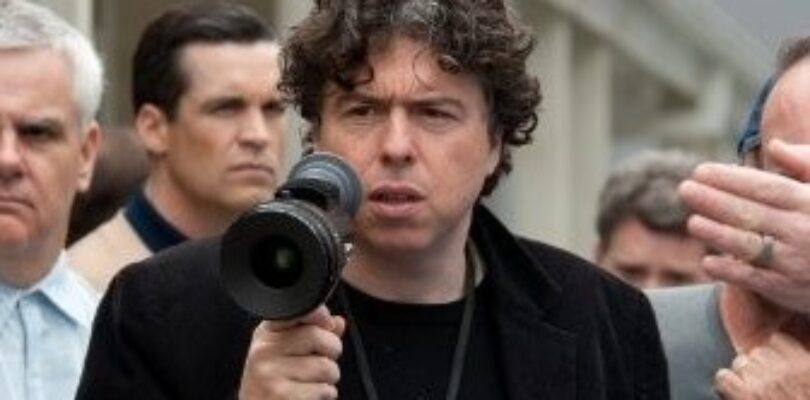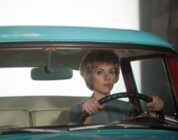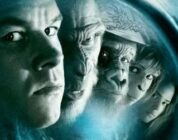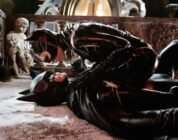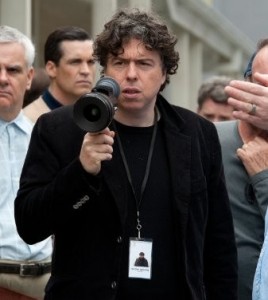
Based on the Stephen Rebello book, Alfred Hitchcock and the Making of Psycho, Gervasi’s new film tells the story of Hitchcock’s experiences during the making of the film Psycho, albeit with a few creative flourishes. But, it’s far more than a simple “making of” behind-the-scenes biography, the screenplay by John McLaughlin interjects an exploration of the relationship between Hitchcock (Anthony Hopkins) and his wife Alma Reville (Helen Mirren) that gives the film a greater resonance than one would think at first glance. It also features a score by Danny Elfman which perfectly complements the seminal Psycho score composed by Bernard Hermann.
During a recent conversation with Gervasi, we discussed Hitchcock. But, we began by talking about his insanely busy schedule of interviews, meetings, lunches, etc. and agreed it was far better to be busy and in demand than to not be either. After speaking with him, it’s impossible not to be a fan of the director and be infected with his enthusiasm for filmmaking, film history, as well as the films of Alfred Hitchcock.
____________________________________________________________
CinemaNerdz: What was it about the story of Hitchcock that compelled you to tell it?
SACH GERVASI: You know I’d just made a documentary called Anvil: The Story of Anvil and I’d put all my own money into it and it was a huge crazy undertaking and I risked pretty much everything I had to do it and no one really wanted to buy it. And then I took it out and it took some time but [it] eventually came together in the end. So when I got Stephen Rebello’s book and John McLaughlin’s script and I heard this story about Hitchcock pretty much risking everything he had, I was sort of, I thought, oh my god, what a lunatic and [I] sort of had some understanding of what it might have taken to do that. But, I think what compelled me to tell it emotionally was the story of his marriage which I had no idea about. I’d been to film school. I’d studied at UCLA under Howard Suber who’s famous for the film studies classical structure. He opens, the Greatest Scenes in the History of Cinema is one of the sections and the first scene he shows is the shower scene. He talked about Alma a little bit and…back in film school, we knew of Alma’s existence. I think that most people who are fans of Hitchcock or film historians know of her. But, I didn’t really know the whole story.
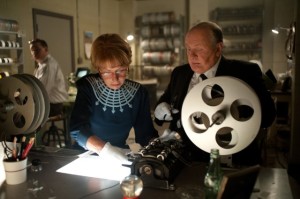
Anthony Hopkins and Helen Mirren in “Hitchcock.” Photo by Suzanne Tenner – © 2012 – Fox Searchlight Pictures.
I had no idea how sort of integral she was to his process and even in the example of the shower scene and the music. You know, there was an argument famously that went between [Bernard] Hermann and Hitchcock about whether there should be any music. Hitchcock was adamant that there should be no music at all, it should just be the sound of screams and running water and a montage. And Hermann, initially I think did a jazz cue and he said “No you’ve got to put music in it.” And Hitchcock refused. Alma was like the referee in this little sort of standout drag-down sort of fight that they had. And she said, “Listen Bernie, come back with something else and I’m going to make Alfred listen to it.” And so he did. And he came back with the now landmark sort of cue, the shower music cue. And Hitchcock sill refused, and Alma said “You’ve got to listen to this music.” And he did. And upon listening to it, I think for the second time, he said, “Um, perhaps my earlier instinct was inappropriate.” That was all he would say rather than “You’re right.” And I think it was because of Alma largely that there was music in that scene. And you think about just that decision alone…she’s already made a major contribution let alone the whole of that film and all of the others. You know, Hitchcock said of Alma, “I would rather not make a film without her.” He really trusted her. He relied on her. When there was a final say about an issue of taste, she had excellent instincts for what the audience would accept and wouldn’t. She had an incredible eye for detail. And Hitchcock really relied on her. Even at the earliest script stage, if Hitchcock met a writer, he wouldn’t say “I liked your script,” he would say “Alma enjoyed your pages.” You know, it was a very complex, symbiotic collaboration as well as it was a marriage. And I thought that was a really interesting story. To me it was a story about unrecognized partners who often stand in the shadows and it was about marriage – how hard it can be – it was about a lot of other things beyond the specifics of that story.
CinemaNerdz: In previous interviews, you’ve drawn comparisons between Anvil and Hitchcock and the relationship and the nature of collaboration in relationships….
GERVASI: They’re very, very different films. They’re remarkably different films. But I do believe that there is an emotional core that‘s quite similar. And that core is of two people who have been together – in Anvil’s case thirty-five years and in the Hitchcock case, thirty-six years – similar amounts of time, who live and collaborate and create with each other and yet…one without the other is not as strong as both of them together. And I just found that type of creative collaboration and dynamic to be fascinating. So, what I’m saying is there’s an emotional core to this Hitchcock story that does intersect with the movie I made about the rock band and yet they couldn’t be more different on the surface but underneath, there is something similar.
CinemaNerdz: So, is it safe to say that’s a theme you might explore again in the future?
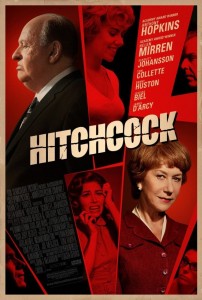
CinemaNerdz: What challenges did you face jumping from the documentary to the narrative form?
GERVASI: Well, I think they’re very different, you know, in one sense. I mean, obviously the documentary you’re shooting in pieces over two or three years. And in a narrative film, you’re preparing but you’re shooting in two months. But I think that what unites, I mean the intersecting sort of thing about them is you’re looking for emotional truth in performance. You’re looking for a moment that reaches out from the screen and grabs the audience and connects with them. So, you’re looking for the same things, you’re just applying a different set of skills and it’s a different sort of arena in which they’re being applied. But, there are big, big differences but there are also big similarities. Both films are about people, and I think that’s why I’m interested in character stories. But, yeah, in terms of editing and shooting and, obviously preproduction, they’re very different in one sense. It seemed the natural next step to do this in a strange way.
CinemaNerdz: Anthony Hopkins and Helen Mirren are great in the movie, what was it like working with actors of their caliber?
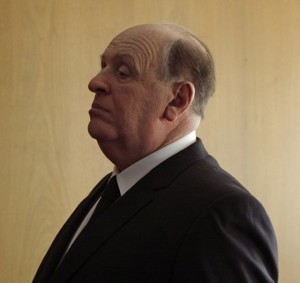
Anthony Hopkins in “Hitchcock.”
GERVASI: It was extraordinary. I felt like I had a front row [seat] for the greatest film school in the world. You know, I’m sitting there with Anthony Hopkins and Helen Mirren and I just learned so much. I mean, I’d grown up watching them on stage and screen and here they were, and I was working with them. And by the way, this is the very first time they’ve ever worked together. So that was a unique thing to be part of. I think when I thought about it, it was probably intimidating but they were so sweet with me. You know, we had a job to do…it was like a team. It was a very collaborative, nurturing atmosphere. They really wanted…they really supported me. The obviously trusted me, they gave me this incredible chance…it was pretty extraordinary.
CinemaNerdz: Any funny stories from the set? I know in the movie there’s a reference to the jokes that Hitchcock would play on set, anything like that?
GERVASI: I mean, there were tons of funny things. (Laughs.) I’ll tell you a story in rehearsal, referring back to your earlier question. On the second day of rehearsal, I’d plucked up the courage to make a suggestion to Helen Mirren, “Why don’t you try it this way?” And she said, “Okay darling. I’ll try it.” And she did it. And it was actually better. And she said “Good, good, good Sacha, that’s good.” And then we sort of continued rehearsing and that was the moment I remember becoming a director, when I’d made the suggestion to Helen Mirren and she did it and actually improved the scene and then I thought to myself “My god, it’s me in this bathroom with just Anthony Hopkins and Helen Mirren and they’re listening to me.” And I thought to myself, “There’s something wrong with them. What are they doing? They shouldn’t be listening to me.” (Laughs.) But, you know, I had those thoughts and I just had to get on with directing them and it was tremendous fun.
CinemaNerdz: It comes through in the movie, definitely.
GERVASI: Good.
CinemaNerdz: The film does seem to utilize the Hitchcock style in several instances such as visual cues and pacing, can you speak a little about the choices you made to achieve that style?
GERVASI: We were making a Hitchcock film. There were so many great POV shots and things that clearly were inspired by Hitchcock movies. The irony, of course, is that we’re applying them to his own sort of domestic drama. There are actually eight specific Hitchcock visual references and no one I know yet has found all of them. Some of them are obvious like in the beginning at the premier when that shot barrels down quickly over the marquee of the theater through the rain onto the umbrellas. Obviously that’s from Foreign Correspondent. And then the scene where Hitch dials home and Alma picks up thinking it’s Whit and we do the reverse shot of Hitchcock and we push on the back of his head while the telephone cord is coiled around his neck, obviously that’s Dial M for Murder. There are clear Hitchcock references in it and we just had fun with it. We wanted to sort of…we used them where we felt the story needed them and where [they] might help the story. Believe me, we wanted to stay true to the mischievous, droll Hitchcock spirit, which is to entertain an audience and have fun with [the film]. And for those who understand and know those references, hopefully that just adds an extra dimension of fun for them – to try and spot them. But they’re all in there and there are some really great, funny ones.
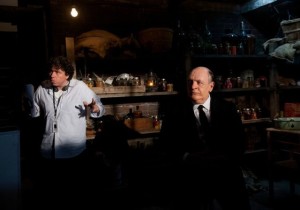
Anthony Hopkins and director Sacha Gervasi on the set of “Hitchcock.”
CinemaNerdz: Do you have any favorite Hitchcock films?
GERVASI: Well, I’d have to say Vertigo because I think Vertigo is one of his most unintentionally revealing films. It’s so personal. You see the tenderness and the yearning and that frustration of wanting to have something that you can’t have. It’s incredibly…it’s a really…I think you see the tenderness and heart in that film. It’s not necessarily a part of him that we’ve come to know because, for so long he’s been seen in a very specific way. You know, he treats actors horribly or he’s a monster or he’s this or he’s that. We tried to show all those aspects and the darker aspects, when he’s cruel to his wife and directing Janet Leigh when he’s mean and the shower scene when he’s completely out of control. But we also wanted to show the tenderness and warmth that was clearly there in films like Vertigo. And we didn’t want to come down on a particular side of making a judgment about him just to sort of reveal yet more layers to this sort of endlessly intriguing, fascinating, and complex character. And I think the reason everyone loves, [or is] sort of fascinated by, trying to crack the Hitchcock code, so to speak, is because his films endure and they’re so phenomenal and they’re so rich and they’re also so disparate. You’ve got Psycho, you’ve got Lifeboat, you’ve got The Man Who Knew Too Much, you’ve got Vertigo, you’ve got Rope, you’ve got Saboteur, you’ve got Rebecca, you’ve got so many different types of movies and I think he’s sort of…he’s unbelievable. He’s sort of dazzling in the range of things that he can do. But I would have to say if you asked me to choose one film, it’s Vertigo.
CinemaNerdz: One of my favorite scenes is the premier where Hitchcock is conducting the shower scene from the lobby….
GERVASI: Yeah, love that scene.
CinemaNerdz: One of the key elements in this scene is, of course, the music. What was it like working with Danny Elfman?
GERVASI: Danny Elfman, I mean he was great. He was on the set. He never comes to the set and one day, I remember one day we were shooting a scene and suddenly I turned around and there was this sort of curious looking ginger-haired gentleman with headphones watching the monitor. And he was quite…he was in an odd mode at that particular moment. He was looking like a bit of a mad person that day. Someone said, “That’s Danny Elfman.” I was like, “What the hell is Danny Elfman doing here?” And they said, “Well he’s interested in doing the score.” And I was like “What?” And then I discovered, [after] speaking to Danny, that the reason he became a composer was because of Bernard Hermann. At the end of the first day, he watched studiously, he comes up to me and said, “Would you mind if I came back tomorrow?” I said, “Absolutely not.” And I couldn’t believe it. So I knew Danny was really passionate about it. And he was overbooked and he was working really hard. But people were telling him he didn’t have time. And he just absolutely insisted on finding the time and we made it work. And I think he did one of his most beautiful scores that he’s ever done actually – this wonderful love theme that he came up with and all this incredible music.
CinemaNerdz: Yes, it was quite poignant.
GERVASI: It was great. It was great.
CinemaNerdz: Thank you for your time and best of luck with the schedule the next few days.
GERVASI: (Laughs.) And listen tell all your friends about the film.
CinemaNerdz: I plan to, and I have been.
____________________________________________________________
Keeping a promise – Check out Sacha Gervasi’s film Hitchcock in theaters now!

